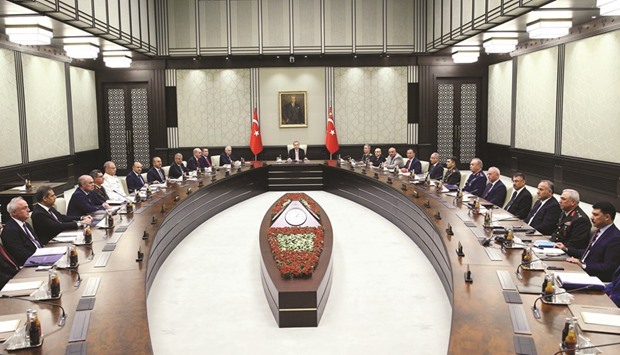Turkish President Recep Tayyip Erdogan chaired a meeting of the National Security Council in Ankara yesterday in the wake of the failed coup attempt, with the potential for decisions on new security measures.
The meeting of the council – which brought together civilian and military leaders – lasted four hours and 40 minutes, state broadcaster TRT reported.
It was to be followed by a cabinet meeting, also chaired by the president, who arrived in the capital on Tuesday evening for the first time since the failed putsch.
Nurettin Canikli, a deputy prime minister, ruled out the imposition of martial law, speaking ahead of the start of the high-level meetings, according to broadcaster Haberturk.
He added that the measures to be taken will provide stability and fall within the legal framework.
All political parties in Turkey’s parliament rejected the coup attempt, which began on Friday and left hundreds dead.
But the pro-Kurdish Peoples’ Democratic Party (HDP) voiced concern about reprisals against the opposition, with lawmaker Ziya Pir telling DPA that other factions “are afraid of being lynched”.
Pir also charged that the anti-coup street protests have been largely in favour of Erdogan, rather than democracy, creating a “heated” mood in the country.
“Unfortunately, we are seeing a civilian counter-coup,” he says, but stressing: “Thank God the coup was averted.”
A government official thanked all opposition parties on behalf of the president and the prime minister “for their strong stance against the coup”.
The official stressed there had not been “a single incident” in which a member of the opposition had been attacked.
More than 50,000 civil servants have been fired, suspended or detained in the purge that followed the failed coup, including nearly 3,000 members of the judiciary.
Meanwhile, Ratings agency Standard and Poor’s downgraded the nation’s credit rating by one notch – taking the foreign currency rating to BB from BB-plus.
“We believe the polarisation of Turkey’s political landscape has further eroded its institutional checks and balances,” the agency said, putting its outlook to “negative”.
“We expect a period of heightened unpredictability that could constrain capital inflows into Turkey’s externally leveraged economy,” a statement by the agency said, adding that the outlook could be revised if the “independence of key institutions was not eroded”.
The lira dropped further, to 3.07 to the dollar.
Prior to the failed coup, the Turkish currency was trading at about 2.85 to the greenback.
Turkey has demanded the extradition of Fethullah Gulen, an Islamic cleric living in self-imposed exile in the United States, claiming that he was behind the coup attempt.
Gulen, a one-time ally of Erdogan, denies involvement.
Turkey sent the United States four dossiers on Gulen and has promised to provide ample evidence on his involvement.
The US confirmed receipt of the documents but declined to say they constituted a formal extradition request.

Erdogan chairing the National Security Council meeting at the presidential palace in Ankara.
